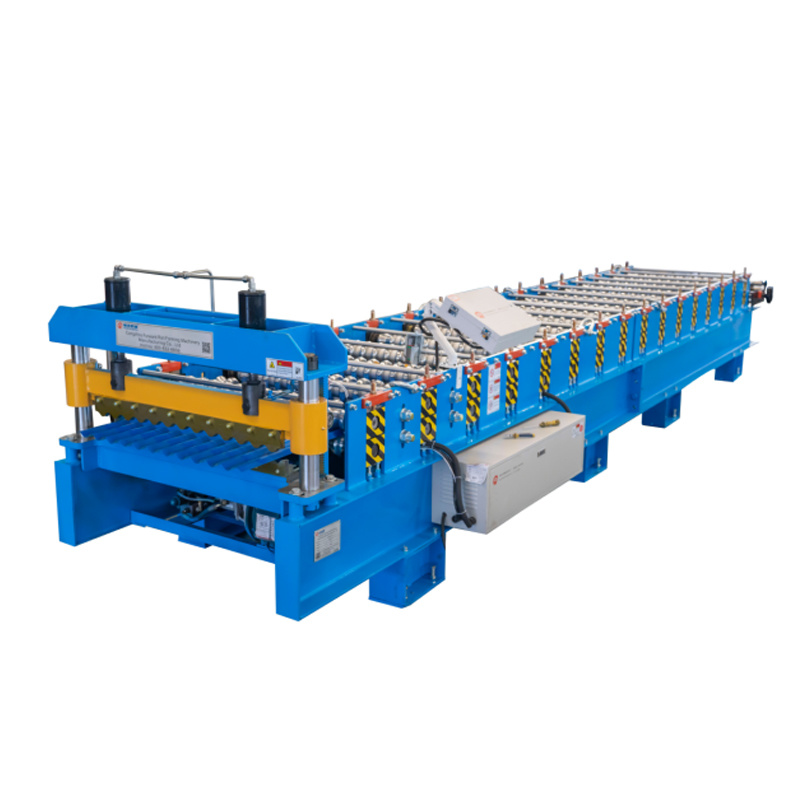The Vital Role of Precision in Roll Forming Line Machines: Elevating Manufacturing Standards

The Importance of Precision in Roll Forming Line Machines
Roll forming line machines play a crucial role in the manufacturing industry, providing a necessary process for producing parts and components with specific shapes and dimensions. **Precision** in these machines is paramount, as it directly influences product quality, production efficiency, and overall operational costs. This article delves deep into the significance of precision in roll forming machines, exploring various aspects that impact their functionality and effectiveness.
Understanding Roll Forming: A Brief Overview
Roll forming is a continuous bending operation in which a long strip of metal is gradually shaped into the desired cross-section through a series of consecutive rolls. This process is widely utilized in industries such as automotive, construction, and appliance manufacturing. The ability to produce uniform and high-quality components consistently depends heavily on the precision of the roll forming line machines.
The Mechanics Behind Roll Forming Machines
Roll forming machines typically consist of several critical components that work in unison to achieve desired outcomes:
1. **Feeding System**: Responsible for introducing the raw material into the machine.
2. **Roll Stations**: A series of rolls that progressively shape the material into the final profile.
3. **Cut-off Mechanism**: Ensures that the product is cut to the specified length.
4. **Control System**: Manages the entire operation, including speed, temperature, and alignment.
Each of these components must operate with high degrees of precision to ensure the final product meets quality standards.
Why Precision Matters in Roll Forming
The role of precision in roll forming line machines cannot be overstated. Here are several key reasons why it is essential:
1. Product Quality and Consistency
Precision directly correlates with the quality of the final product. When roll forming machines operate with high accuracy, they create parts that meet exact specifications. This is critical in industries where even **slight deviations** can lead to product failure. Consistent quality also fosters customer trust and brand loyalty.
2. Reducing Material Waste
Manufacturing processes that lack precision often lead to increased material waste. Inaccurate cuts or improperly shaped components require rework or disposal, resulting in higher costs. By investing in precision roll forming machines, manufacturers can minimize waste, thus improving their bottom line.
3. Enhancing Production Efficiency
Precision in machine operation can significantly enhance production efficiency. When machines function smoothly without frequent adjustments or setups, they operate at optimal speeds. This efficiency not only saves time but also decreases labor costs and increases throughput.
Factors Influencing Precision in Roll Forming Machines
Understanding the various factors that influence the precision of roll forming machines is crucial for optimizing performance.
1. Machine Calibration
Regular calibration is essential for maintaining the precision of roll forming machines. This involves adjusting machine settings and components to ensure they are functioning correctly and producing accurate results. Failure to calibrate machines can lead to misalignments and inaccuracies.
2. Material Quality
The quality of the raw material used in the roll forming process also plays a significant role in achieving precise results. Materials with inconsistent thickness or composition can lead to unpredictable outcomes. It is crucial to source high-quality materials that meet industry standards.
3. Tooling and Die Design
The design of the tooling and dies used in roll forming machines can greatly impact precision. Well-engineered dies reduce wear and tear and ensure that products are formed accurately. Investing in advanced tooling can lead to significant improvements in precision and quality.
4. Operator Expertise
The skill and experience of the machine operator are pivotal in maintaining precision. An adept operator understands how to adjust settings, troubleshoot issues, and ensure that the machine runs effectively. Providing regular training can enhance operator expertise and consequently improve machine performance.
The Benefits of Investing in Precision Roll Forming Machines
Investing in precision roll forming machines offers several benefits that can significantly impact a manufacturing operation.
1. Increased Competitive Advantage
Manufacturers that prioritize precision are more likely to produce high-quality products that meet or exceed market expectations. This reliability can set a company apart from its competitors, fostering customer loyalty and attracting new clients.
2. Cost-Effectiveness
While precision machines may require a higher initial investment, the long-term savings often outweigh this cost. Reduced waste, increased efficiency, and lower rework rates contribute to lower overall production costs.
3. Improved Safety Standards
Precision in manufacturing can also enhance safety standards. Well-formed components are less likely to fail during use, reducing the risk of accidents or product recalls. This not only protects consumers but also safeguards the manufacturer's reputation.
Case Studies: Success Stories of Precision Roll Forming
To illustrate the benefits of precision in roll forming, we can look at a few industry success stories.
1. Automotive Industry
An automotive manufacturer implemented precision roll forming machines in their production line, which allowed them to produce lightweight and strong components for their vehicles. As a result, they saw a decrease in material costs and an increase in the performance of their vehicles, enhancing overall customer satisfaction.
2. Construction Industry
A construction equipment manufacturer turned to precision roll forming to create structural components for buildings. By investing in advanced roll forming technology, they achieved tighter tolerances, which improved the structural integrity of their products and reduced installation times on-site.
Future Trends in Roll Forming Precision Technology
As technology evolves, so does the potential for improving precision in roll forming machines. Here are some upcoming trends to watch for:
1. Automation and Robotics
The integration of automation and robotics in roll forming processes is likely to enhance precision further. Automated systems can consistently perform tasks at high speeds, reducing human error and ensuring uniformity.
2. Advanced Monitoring Systems
The introduction of advanced monitoring systems using IoT technology allows manufacturers to track the performance of their machines in real-time. This data can be utilized to make immediate adjustments, ensuring ongoing precision and efficiency.
3. Artificial Intelligence
AI algorithms can analyze production data, predict maintenance needs, and optimize machine settings for enhanced precision. This technology promises to revolutionize the way manufacturers approach roll forming.
FAQs About Precision in Roll Forming Machines
1. What are roll forming line machines used for?
Roll forming line machines are primarily used to create long, uniform metal parts and profiles through a continuous bending process.
2. How does precision affect roll forming quality?
Precision ensures that the dimensions and shapes of the formed parts meet specific tolerances, which is essential for product quality and compatibility in assembly.
3. What are the common materials used in roll forming?
Common materials include steel, aluminum, and other metals, which can be shaped into various profiles.
4. How often should roll forming machines be calibrated?
Calibration frequency depends on usage but should be performed regularly, ideally every few months or after significant production runs to maintain precision.
5. Can precision roll forming machines be retrofitted with modern technology?
Yes, many older roll forming machines can be retrofitted with modern control systems, sensors, and automation features to improve precision and efficiency.
Conclusion
Precision is not merely an operational requirement in roll forming line machines; it is a cornerstone of manufacturing excellence. By understanding the importance of precision and investing in the necessary technologies and training, manufacturers can enhance product quality, reduce waste, and increase efficiency. As the industry continues to evolve, staying ahead of trends in precision technology will be crucial for maintaining a competitive edge and ensuring long-term success in the ever-demanding manufacturing landscape.
Key words:
recommend News
Share



